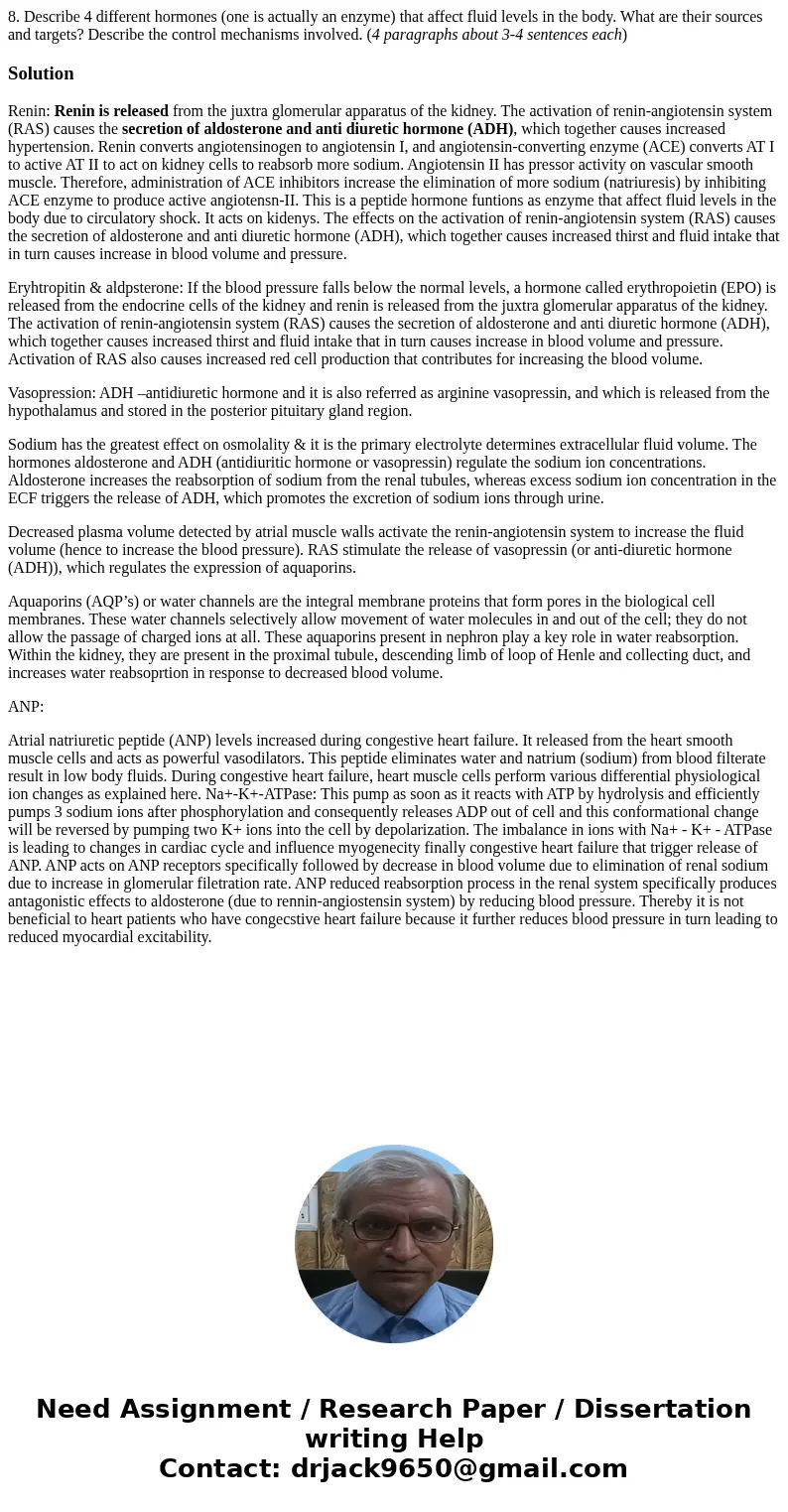8 Describe 4 different hormones one is actually an enzyme th
8. Describe 4 different hormones (one is actually an enzyme) that affect fluid levels in the body. What are their sources and targets? Describe the control mechanisms involved. (4 paragraphs about 3-4 sentences each)
Solution
Renin: Renin is released from the juxtra glomerular apparatus of the kidney. The activation of renin-angiotensin system (RAS) causes the secretion of aldosterone and anti diuretic hormone (ADH), which together causes increased hypertension. Renin converts angiotensinogen to angiotensin I, and angiotensin-converting enzyme (ACE) converts AT I to active AT II to act on kidney cells to reabsorb more sodium. Angiotensin II has pressor activity on vascular smooth muscle. Therefore, administration of ACE inhibitors increase the elimination of more sodium (natriuresis) by inhibiting ACE enzyme to produce active angiotensn-II. This is a peptide hormone funtions as enzyme that affect fluid levels in the body due to circulatory shock. It acts on kidenys. The effects on the activation of renin-angiotensin system (RAS) causes the secretion of aldosterone and anti diuretic hormone (ADH), which together causes increased thirst and fluid intake that in turn causes increase in blood volume and pressure.
Eryhtropitin & aldpsterone: If the blood pressure falls below the normal levels, a hormone called erythropoietin (EPO) is released from the endocrine cells of the kidney and renin is released from the juxtra glomerular apparatus of the kidney. The activation of renin-angiotensin system (RAS) causes the secretion of aldosterone and anti diuretic hormone (ADH), which together causes increased thirst and fluid intake that in turn causes increase in blood volume and pressure. Activation of RAS also causes increased red cell production that contributes for increasing the blood volume.
Vasopression: ADH –antidiuretic hormone and it is also referred as arginine vasopressin, and which is released from the hypothalamus and stored in the posterior pituitary gland region.
Sodium has the greatest effect on osmolality & it is the primary electrolyte determines extracellular fluid volume. The hormones aldosterone and ADH (antidiuritic hormone or vasopressin) regulate the sodium ion concentrations. Aldosterone increases the reabsorption of sodium from the renal tubules, whereas excess sodium ion concentration in the ECF triggers the release of ADH, which promotes the excretion of sodium ions through urine.
Decreased plasma volume detected by atrial muscle walls activate the renin-angiotensin system to increase the fluid volume (hence to increase the blood pressure). RAS stimulate the release of vasopressin (or anti-diuretic hormone (ADH)), which regulates the expression of aquaporins.
Aquaporins (AQP’s) or water channels are the integral membrane proteins that form pores in the biological cell membranes. These water channels selectively allow movement of water molecules in and out of the cell; they do not allow the passage of charged ions at all. These aquaporins present in nephron play a key role in water reabsorption. Within the kidney, they are present in the proximal tubule, descending limb of loop of Henle and collecting duct, and increases water reabsoprtion in response to decreased blood volume.
ANP:
Atrial natriuretic peptide (ANP) levels increased during congestive heart failure. It released from the heart smooth muscle cells and acts as powerful vasodilators. This peptide eliminates water and natrium (sodium) from blood filterate result in low body fluids. During congestive heart failure, heart muscle cells perform various differential physiological ion changes as explained here. Na+-K+-ATPase: This pump as soon as it reacts with ATP by hydrolysis and efficiently pumps 3 sodium ions after phosphorylation and consequently releases ADP out of cell and this conformational change will be reversed by pumping two K+ ions into the cell by depolarization. The imbalance in ions with Na+ - K+ - ATPase is leading to changes in cardiac cycle and influence myogenecity finally congestive heart failure that trigger release of ANP. ANP acts on ANP receptors specifically followed by decrease in blood volume due to elimination of renal sodium due to increase in glomerular filetration rate. ANP reduced reabsorption process in the renal system specifically produces antagonistic effects to aldosterone (due to rennin-angiostensin system) by reducing blood pressure. Thereby it is not beneficial to heart patients who have congecstive heart failure because it further reduces blood pressure in turn leading to reduced myocardial excitability.

 Homework Sourse
Homework Sourse